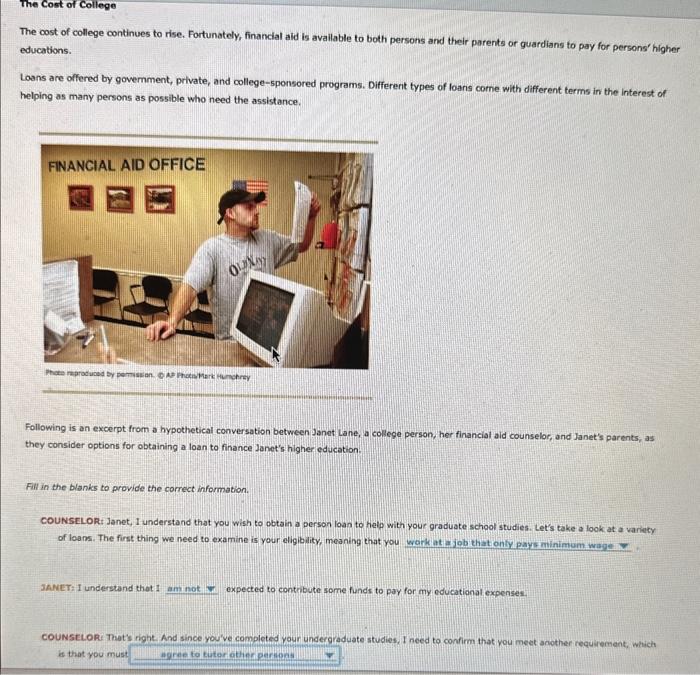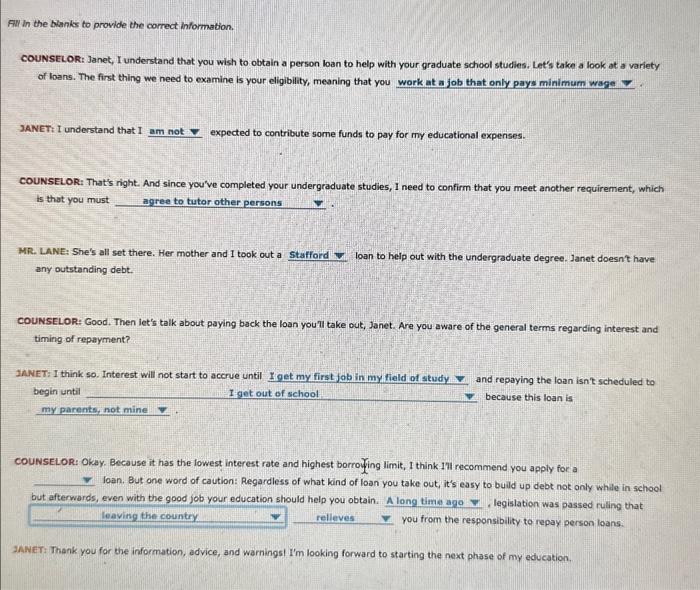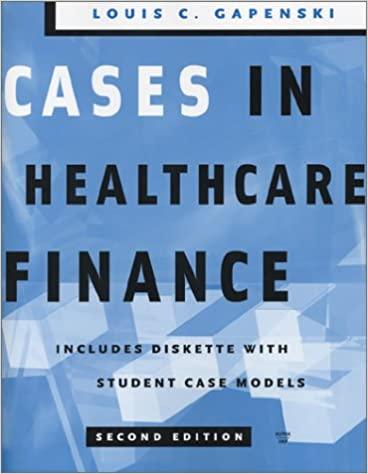The cost of college continues to rise. Fortunately, financial aid is avallable to both persons and their parents or guardians to pay for persons' higher educations. Laans are offered by govemment, private, and college-sponsored programs. Different types of loans come with different terms in the interest of helping as many persons as possible who need the assistance. Following is an excerpt from a hypothetical conversation between Janet Lane, a college person, her financial ald counselor, and Janet's parents, as they consider options for obtaining a loan to finance Janet's higher education. Fill in the blanks to provide the correct information. COUNSELOR: Janet, I understand that you wish to obtain a person loan to help with your graduate school studies. Let's take a look at a variety of loans. The first thing we need to examine is your diglblity, meaning that you work at a job that onty pays minimum wage 7 JANET: I understand thot I expected to contribute some funds to pay for my educationat expenses. COUNSELOR: Thots right. And since you've completed youn underaraduate studies, I need to confirm that you meet another requirement, which is that you must Fll in the blaniss to provide the correct information. COUNSELOR: Janet, I understand that you wish to obtain a person loan to help with your graduate school studies. Let's take a look at a variety of loans. The first thing we need to examine is your eligibility, meaning that you work at a job that only pays minimum wage . JANET: I understand that I expected to contribute some funds to pay for my educational expenses. COUNSELOR: That's right. And since you've completed your undergraduate studies, I need to confirm that you meet another requirement, which is that you must MR. LANE: She's all set there. Her mother and 1 took out a loan to help out with the undergraduate degree. Janet doesnt have any outstanding debt. COUNSELOR: Good. Then let's talk about paying back the loan you'll take out, Janet. Are you aware of the general terms regarding interest and timing of repayment? IANET: I think so. Interest will not start to accoue until I get my first job in my field of study v, and repaying the loan isnt scheduled to begin until get out of school because this loan is COUNSELOR: Okay. Because it has the lowest interest rate and highest borroyling limit, I think . II recommend you apply for a loan. But one word of caution: Regardless of what kind of loan you take out, it's easy to buald up debt not only while in school but afterwards, even with the good job your education should help you obtain. , legislation was passed ruling that you from the responsibility to repay person loans: 2NNET: Thank you for the information, advice, and warningsl I'm looking forward to starting the next phase of my education. The cost of college continues to rise. Fortunately, financial aid is avallable to both persons and their parents or guardians to pay for persons' higher educations. Laans are offered by govemment, private, and college-sponsored programs. Different types of loans come with different terms in the interest of helping as many persons as possible who need the assistance. Following is an excerpt from a hypothetical conversation between Janet Lane, a college person, her financial ald counselor, and Janet's parents, as they consider options for obtaining a loan to finance Janet's higher education. Fill in the blanks to provide the correct information. COUNSELOR: Janet, I understand that you wish to obtain a person loan to help with your graduate school studies. Let's take a look at a variety of loans. The first thing we need to examine is your diglblity, meaning that you work at a job that onty pays minimum wage 7 JANET: I understand thot I expected to contribute some funds to pay for my educationat expenses. COUNSELOR: Thots right. And since you've completed youn underaraduate studies, I need to confirm that you meet another requirement, which is that you must Fll in the blaniss to provide the correct information. COUNSELOR: Janet, I understand that you wish to obtain a person loan to help with your graduate school studies. Let's take a look at a variety of loans. The first thing we need to examine is your eligibility, meaning that you work at a job that only pays minimum wage . JANET: I understand that I expected to contribute some funds to pay for my educational expenses. COUNSELOR: That's right. And since you've completed your undergraduate studies, I need to confirm that you meet another requirement, which is that you must MR. LANE: She's all set there. Her mother and 1 took out a loan to help out with the undergraduate degree. Janet doesnt have any outstanding debt. COUNSELOR: Good. Then let's talk about paying back the loan you'll take out, Janet. Are you aware of the general terms regarding interest and timing of repayment? IANET: I think so. Interest will not start to accoue until I get my first job in my field of study v, and repaying the loan isnt scheduled to begin until get out of school because this loan is COUNSELOR: Okay. Because it has the lowest interest rate and highest borroyling limit, I think . II recommend you apply for a loan. But one word of caution: Regardless of what kind of loan you take out, it's easy to buald up debt not only while in school but afterwards, even with the good job your education should help you obtain. , legislation was passed ruling that you from the responsibility to repay person loans: 2NNET: Thank you for the information, advice, and warningsl I'm looking forward to starting the next phase of my education








